Sustainable and Ethical Tourism in Brazil
VerifiedAdded on 2023/02/01
|10
|2265
|28
AI Summary
This document provides a critical analysis of sustainable and ethical tourism in Brazil. It discusses the geographical landscape, tourist products, segments, stakeholders, and the importance of tourism in the Brazilian economy. The challenges faced by Brazil as a tourist center, such as violence and language barriers, are also addressed. Additionally, the document explores the principles of sustainable tourism in developing and managing new tourism destinations, as well as the role of stakeholders in the development of sustainable tourism destinations.
Contribute Materials
Your contribution can guide someone’s learning journey. Share your
documents today.
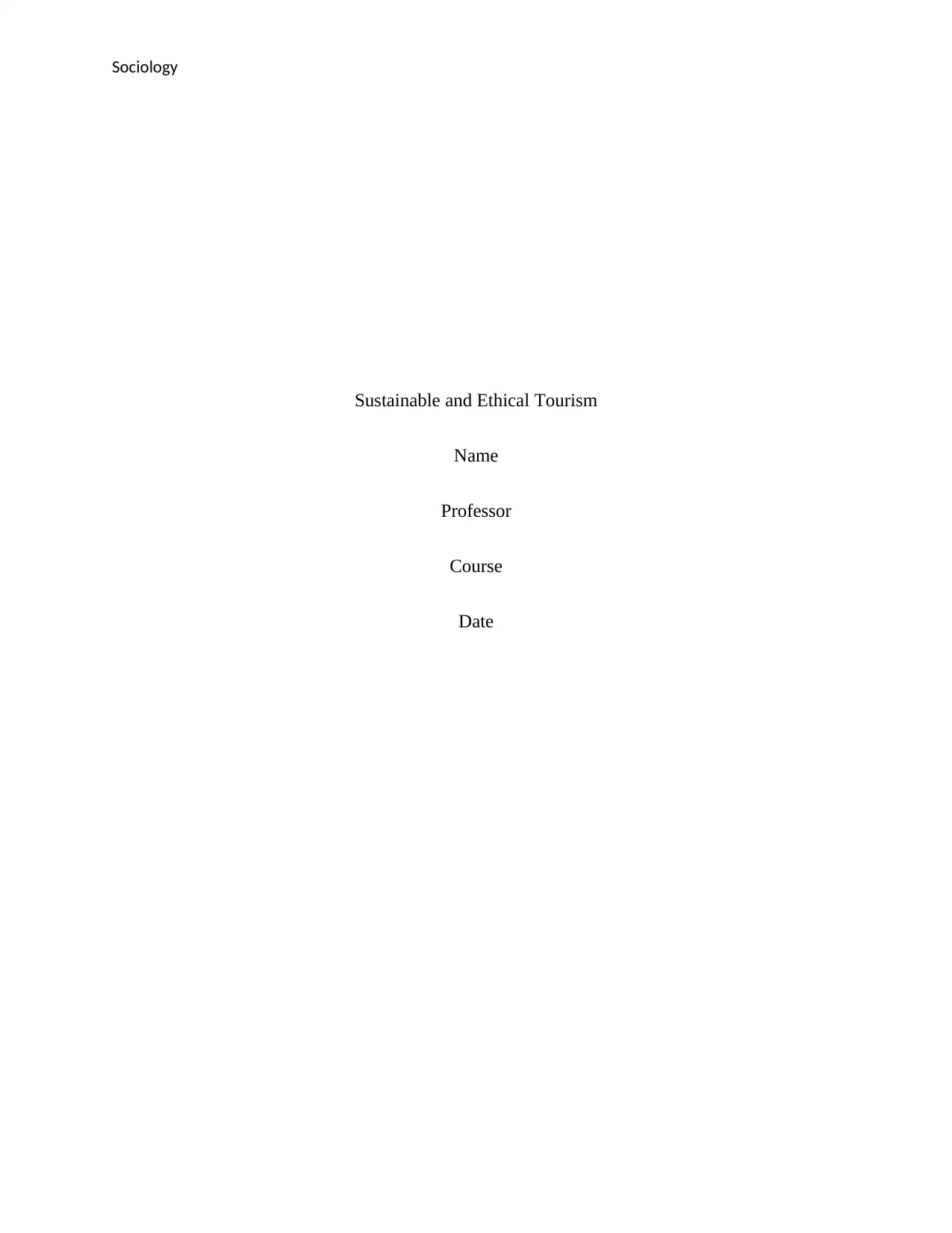
Sociology
Sustainable and Ethical Tourism
Name
Professor
Course
Date
Sustainable and Ethical Tourism
Name
Professor
Course
Date
Secure Best Marks with AI Grader
Need help grading? Try our AI Grader for instant feedback on your assignments.
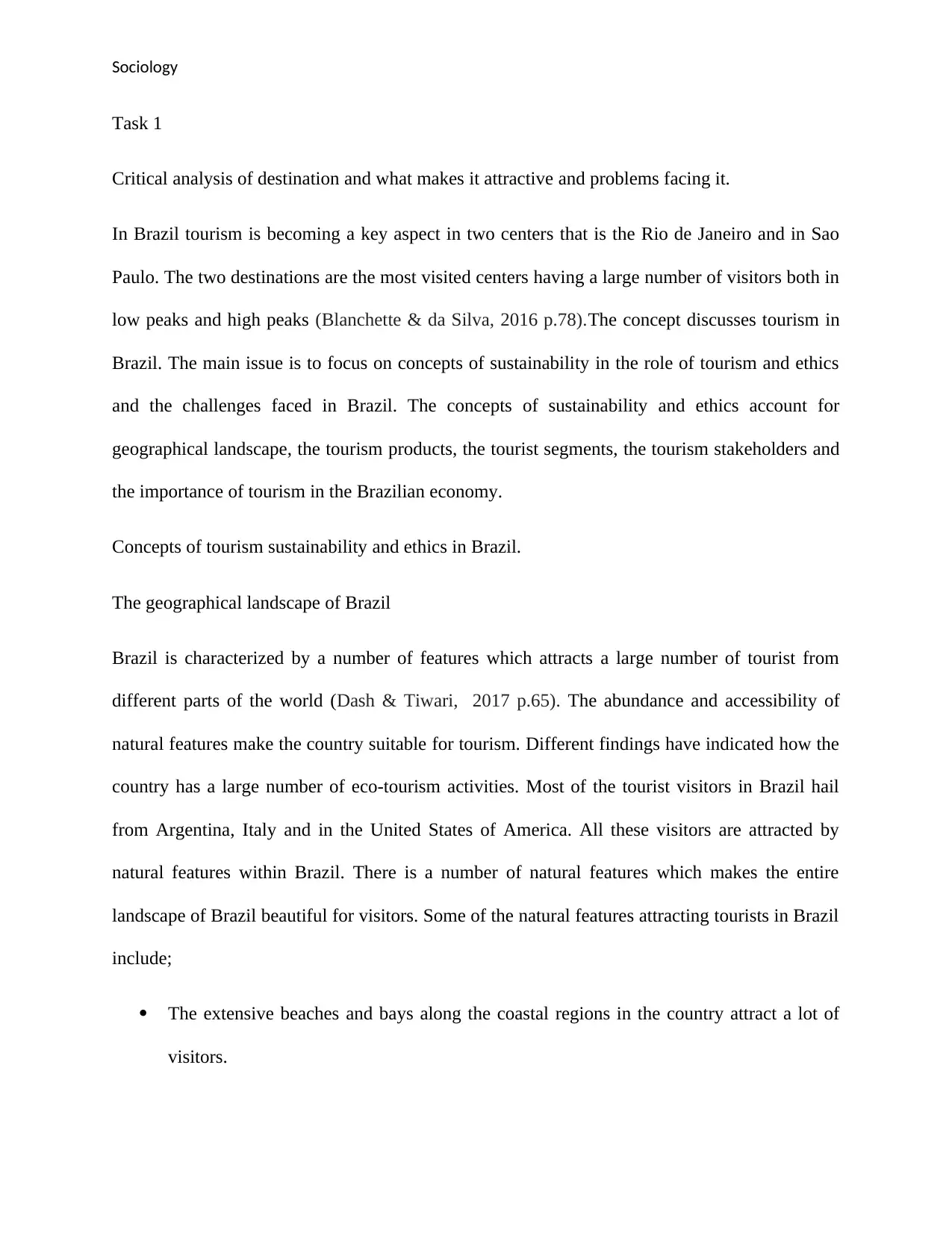
Sociology
Task 1
Critical analysis of destination and what makes it attractive and problems facing it.
In Brazil tourism is becoming a key aspect in two centers that is the Rio de Janeiro and in Sao
Paulo. The two destinations are the most visited centers having a large number of visitors both in
low peaks and high peaks (Blanchette & da Silva, 2016 p.78).The concept discusses tourism in
Brazil. The main issue is to focus on concepts of sustainability in the role of tourism and ethics
and the challenges faced in Brazil. The concepts of sustainability and ethics account for
geographical landscape, the tourism products, the tourist segments, the tourism stakeholders and
the importance of tourism in the Brazilian economy.
Concepts of tourism sustainability and ethics in Brazil.
The geographical landscape of Brazil
Brazil is characterized by a number of features which attracts a large number of tourist from
different parts of the world (Dash & Tiwari, 2017 p.65). The abundance and accessibility of
natural features make the country suitable for tourism. Different findings have indicated how the
country has a large number of eco-tourism activities. Most of the tourist visitors in Brazil hail
from Argentina, Italy and in the United States of America. All these visitors are attracted by
natural features within Brazil. There is a number of natural features which makes the entire
landscape of Brazil beautiful for visitors. Some of the natural features attracting tourists in Brazil
include;
The extensive beaches and bays along the coastal regions in the country attract a lot of
visitors.
Task 1
Critical analysis of destination and what makes it attractive and problems facing it.
In Brazil tourism is becoming a key aspect in two centers that is the Rio de Janeiro and in Sao
Paulo. The two destinations are the most visited centers having a large number of visitors both in
low peaks and high peaks (Blanchette & da Silva, 2016 p.78).The concept discusses tourism in
Brazil. The main issue is to focus on concepts of sustainability in the role of tourism and ethics
and the challenges faced in Brazil. The concepts of sustainability and ethics account for
geographical landscape, the tourism products, the tourist segments, the tourism stakeholders and
the importance of tourism in the Brazilian economy.
Concepts of tourism sustainability and ethics in Brazil.
The geographical landscape of Brazil
Brazil is characterized by a number of features which attracts a large number of tourist from
different parts of the world (Dash & Tiwari, 2017 p.65). The abundance and accessibility of
natural features make the country suitable for tourism. Different findings have indicated how the
country has a large number of eco-tourism activities. Most of the tourist visitors in Brazil hail
from Argentina, Italy and in the United States of America. All these visitors are attracted by
natural features within Brazil. There is a number of natural features which makes the entire
landscape of Brazil beautiful for visitors. Some of the natural features attracting tourists in Brazil
include;
The extensive beaches and bays along the coastal regions in the country attract a lot of
visitors.
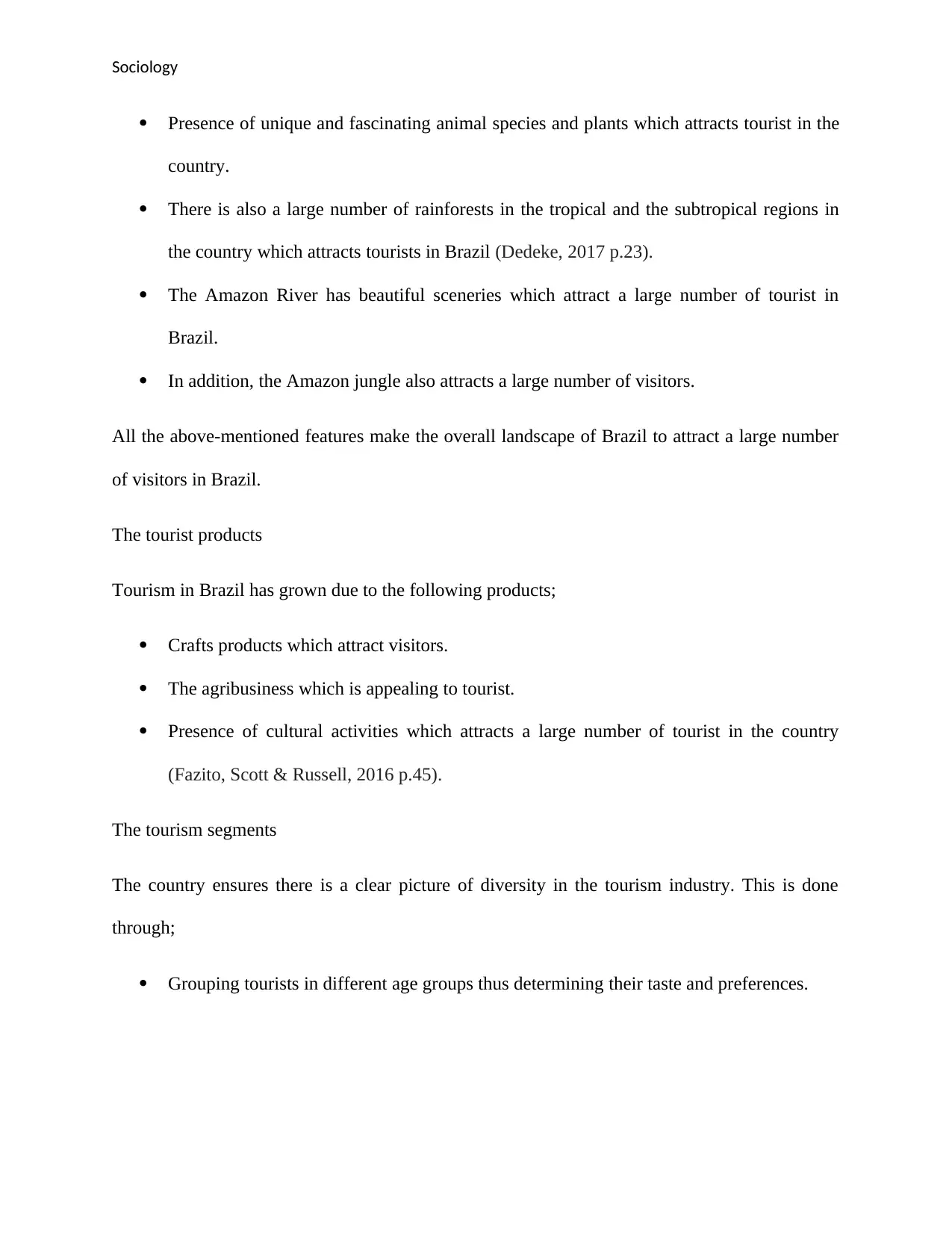
Sociology
Presence of unique and fascinating animal species and plants which attracts tourist in the
country.
There is also a large number of rainforests in the tropical and the subtropical regions in
the country which attracts tourists in Brazil (Dedeke, 2017 p.23).
The Amazon River has beautiful sceneries which attract a large number of tourist in
Brazil.
In addition, the Amazon jungle also attracts a large number of visitors.
All the above-mentioned features make the overall landscape of Brazil to attract a large number
of visitors in Brazil.
The tourist products
Tourism in Brazil has grown due to the following products;
Crafts products which attract visitors.
The agribusiness which is appealing to tourist.
Presence of cultural activities which attracts a large number of tourist in the country
(Fazito, Scott & Russell, 2016 p.45).
The tourism segments
The country ensures there is a clear picture of diversity in the tourism industry. This is done
through;
Grouping tourists in different age groups thus determining their taste and preferences.
Presence of unique and fascinating animal species and plants which attracts tourist in the
country.
There is also a large number of rainforests in the tropical and the subtropical regions in
the country which attracts tourists in Brazil (Dedeke, 2017 p.23).
The Amazon River has beautiful sceneries which attract a large number of tourist in
Brazil.
In addition, the Amazon jungle also attracts a large number of visitors.
All the above-mentioned features make the overall landscape of Brazil to attract a large number
of visitors in Brazil.
The tourist products
Tourism in Brazil has grown due to the following products;
Crafts products which attract visitors.
The agribusiness which is appealing to tourist.
Presence of cultural activities which attracts a large number of tourist in the country
(Fazito, Scott & Russell, 2016 p.45).
The tourism segments
The country ensures there is a clear picture of diversity in the tourism industry. This is done
through;
Grouping tourists in different age groups thus determining their taste and preferences.
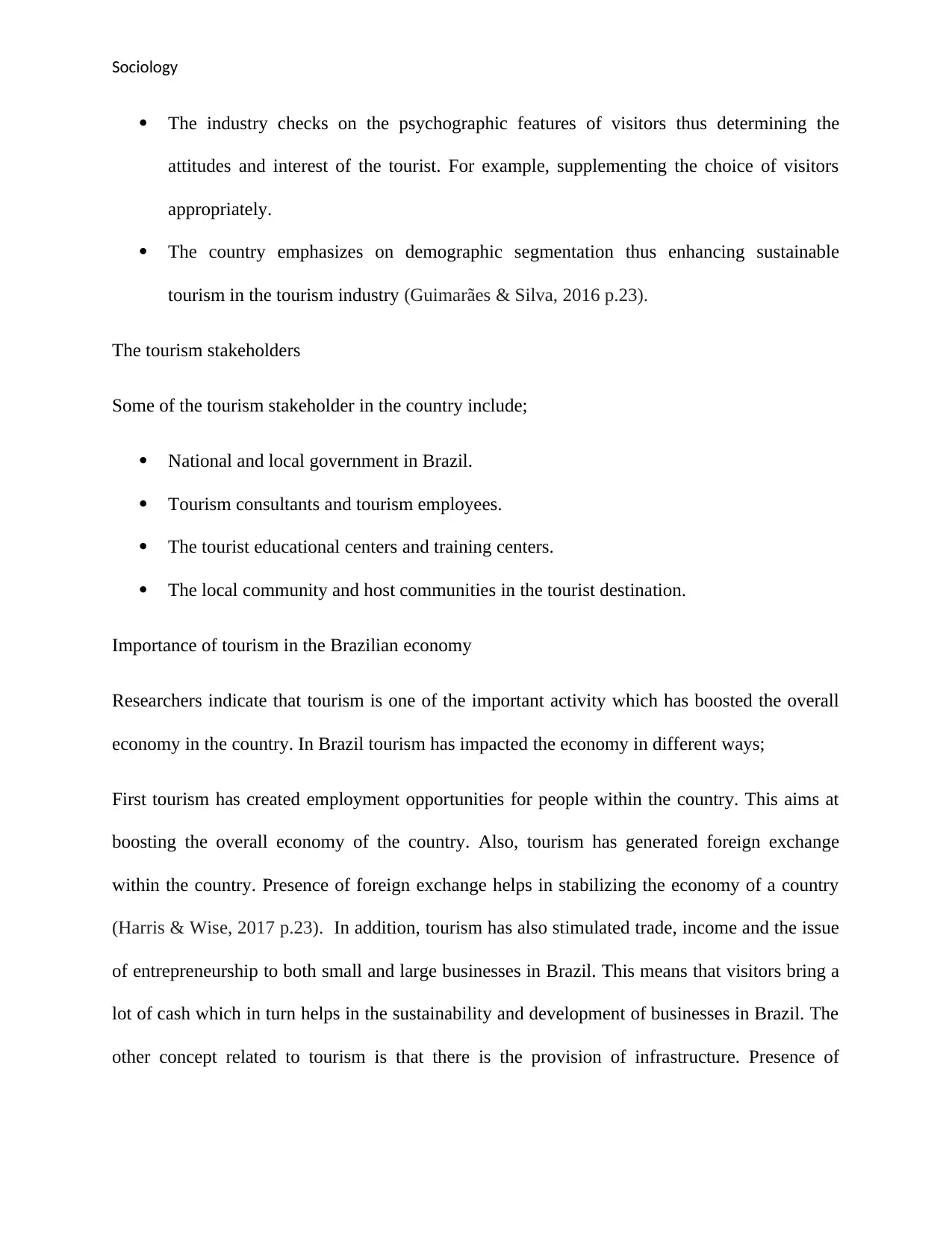
Sociology
The industry checks on the psychographic features of visitors thus determining the
attitudes and interest of the tourist. For example, supplementing the choice of visitors
appropriately.
The country emphasizes on demographic segmentation thus enhancing sustainable
tourism in the tourism industry (Guimarães & Silva, 2016 p.23).
The tourism stakeholders
Some of the tourism stakeholder in the country include;
National and local government in Brazil.
Tourism consultants and tourism employees.
The tourist educational centers and training centers.
The local community and host communities in the tourist destination.
Importance of tourism in the Brazilian economy
Researchers indicate that tourism is one of the important activity which has boosted the overall
economy in the country. In Brazil tourism has impacted the economy in different ways;
First tourism has created employment opportunities for people within the country. This aims at
boosting the overall economy of the country. Also, tourism has generated foreign exchange
within the country. Presence of foreign exchange helps in stabilizing the economy of a country
(Harris & Wise, 2017 p.23). In addition, tourism has also stimulated trade, income and the issue
of entrepreneurship to both small and large businesses in Brazil. This means that visitors bring a
lot of cash which in turn helps in the sustainability and development of businesses in Brazil. The
other concept related to tourism is that there is the provision of infrastructure. Presence of
The industry checks on the psychographic features of visitors thus determining the
attitudes and interest of the tourist. For example, supplementing the choice of visitors
appropriately.
The country emphasizes on demographic segmentation thus enhancing sustainable
tourism in the tourism industry (Guimarães & Silva, 2016 p.23).
The tourism stakeholders
Some of the tourism stakeholder in the country include;
National and local government in Brazil.
Tourism consultants and tourism employees.
The tourist educational centers and training centers.
The local community and host communities in the tourist destination.
Importance of tourism in the Brazilian economy
Researchers indicate that tourism is one of the important activity which has boosted the overall
economy in the country. In Brazil tourism has impacted the economy in different ways;
First tourism has created employment opportunities for people within the country. This aims at
boosting the overall economy of the country. Also, tourism has generated foreign exchange
within the country. Presence of foreign exchange helps in stabilizing the economy of a country
(Harris & Wise, 2017 p.23). In addition, tourism has also stimulated trade, income and the issue
of entrepreneurship to both small and large businesses in Brazil. This means that visitors bring a
lot of cash which in turn helps in the sustainability and development of businesses in Brazil. The
other concept related to tourism is that there is the provision of infrastructure. Presence of
Secure Best Marks with AI Grader
Need help grading? Try our AI Grader for instant feedback on your assignments.
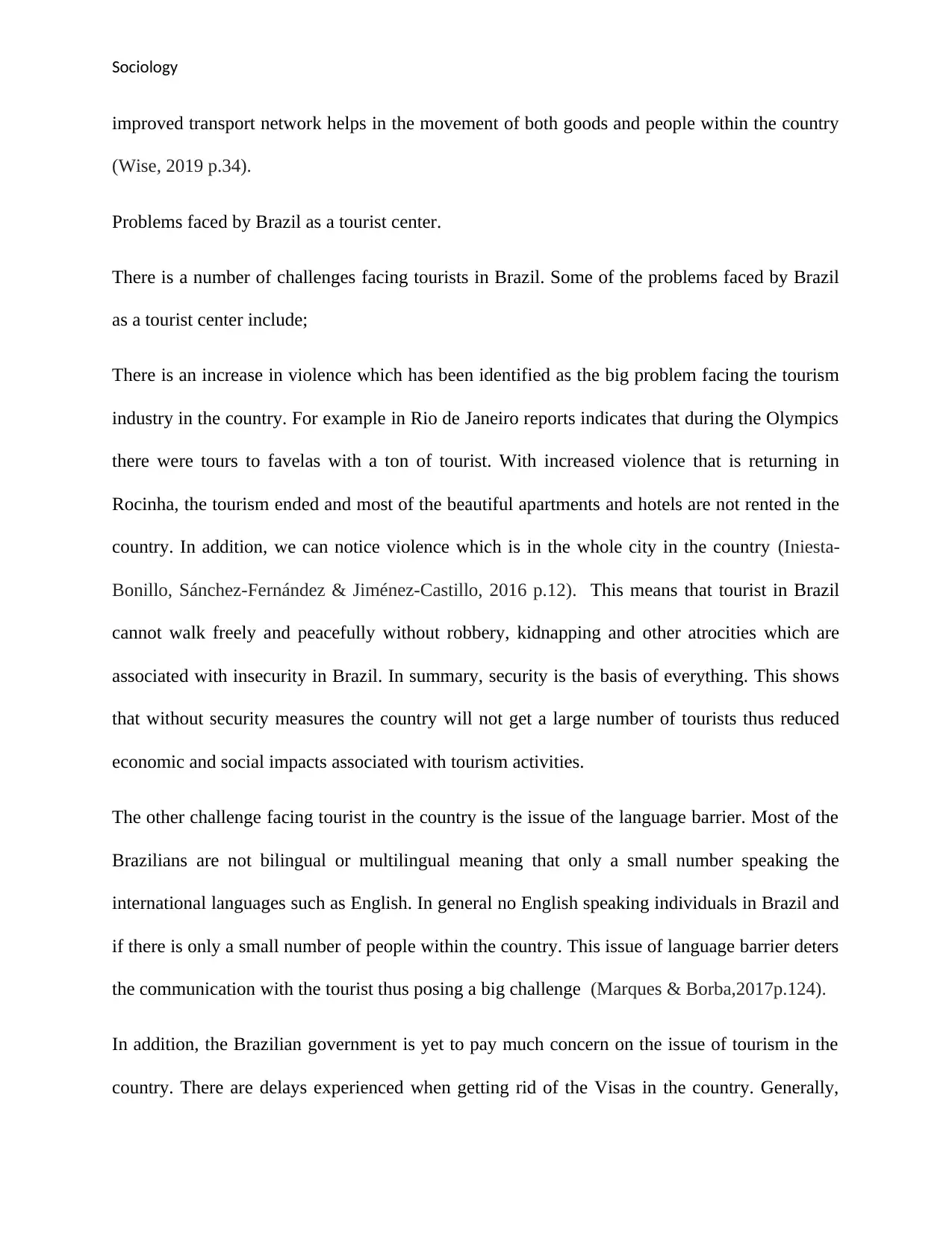
Sociology
improved transport network helps in the movement of both goods and people within the country
(Wise, 2019 p.34).
Problems faced by Brazil as a tourist center.
There is a number of challenges facing tourists in Brazil. Some of the problems faced by Brazil
as a tourist center include;
There is an increase in violence which has been identified as the big problem facing the tourism
industry in the country. For example in Rio de Janeiro reports indicates that during the Olympics
there were tours to favelas with a ton of tourist. With increased violence that is returning in
Rocinha, the tourism ended and most of the beautiful apartments and hotels are not rented in the
country. In addition, we can notice violence which is in the whole city in the country (Iniesta-
Bonillo, Sánchez-Fernández & Jiménez-Castillo, 2016 p.12). This means that tourist in Brazil
cannot walk freely and peacefully without robbery, kidnapping and other atrocities which are
associated with insecurity in Brazil. In summary, security is the basis of everything. This shows
that without security measures the country will not get a large number of tourists thus reduced
economic and social impacts associated with tourism activities.
The other challenge facing tourist in the country is the issue of the language barrier. Most of the
Brazilians are not bilingual or multilingual meaning that only a small number speaking the
international languages such as English. In general no English speaking individuals in Brazil and
if there is only a small number of people within the country. This issue of language barrier deters
the communication with the tourist thus posing a big challenge (Marques & Borba,2017p.124).
In addition, the Brazilian government is yet to pay much concern on the issue of tourism in the
country. There are delays experienced when getting rid of the Visas in the country. Generally,
improved transport network helps in the movement of both goods and people within the country
(Wise, 2019 p.34).
Problems faced by Brazil as a tourist center.
There is a number of challenges facing tourists in Brazil. Some of the problems faced by Brazil
as a tourist center include;
There is an increase in violence which has been identified as the big problem facing the tourism
industry in the country. For example in Rio de Janeiro reports indicates that during the Olympics
there were tours to favelas with a ton of tourist. With increased violence that is returning in
Rocinha, the tourism ended and most of the beautiful apartments and hotels are not rented in the
country. In addition, we can notice violence which is in the whole city in the country (Iniesta-
Bonillo, Sánchez-Fernández & Jiménez-Castillo, 2016 p.12). This means that tourist in Brazil
cannot walk freely and peacefully without robbery, kidnapping and other atrocities which are
associated with insecurity in Brazil. In summary, security is the basis of everything. This shows
that without security measures the country will not get a large number of tourists thus reduced
economic and social impacts associated with tourism activities.
The other challenge facing tourist in the country is the issue of the language barrier. Most of the
Brazilians are not bilingual or multilingual meaning that only a small number speaking the
international languages such as English. In general no English speaking individuals in Brazil and
if there is only a small number of people within the country. This issue of language barrier deters
the communication with the tourist thus posing a big challenge (Marques & Borba,2017p.124).
In addition, the Brazilian government is yet to pay much concern on the issue of tourism in the
country. There are delays experienced when getting rid of the Visas in the country. Generally,
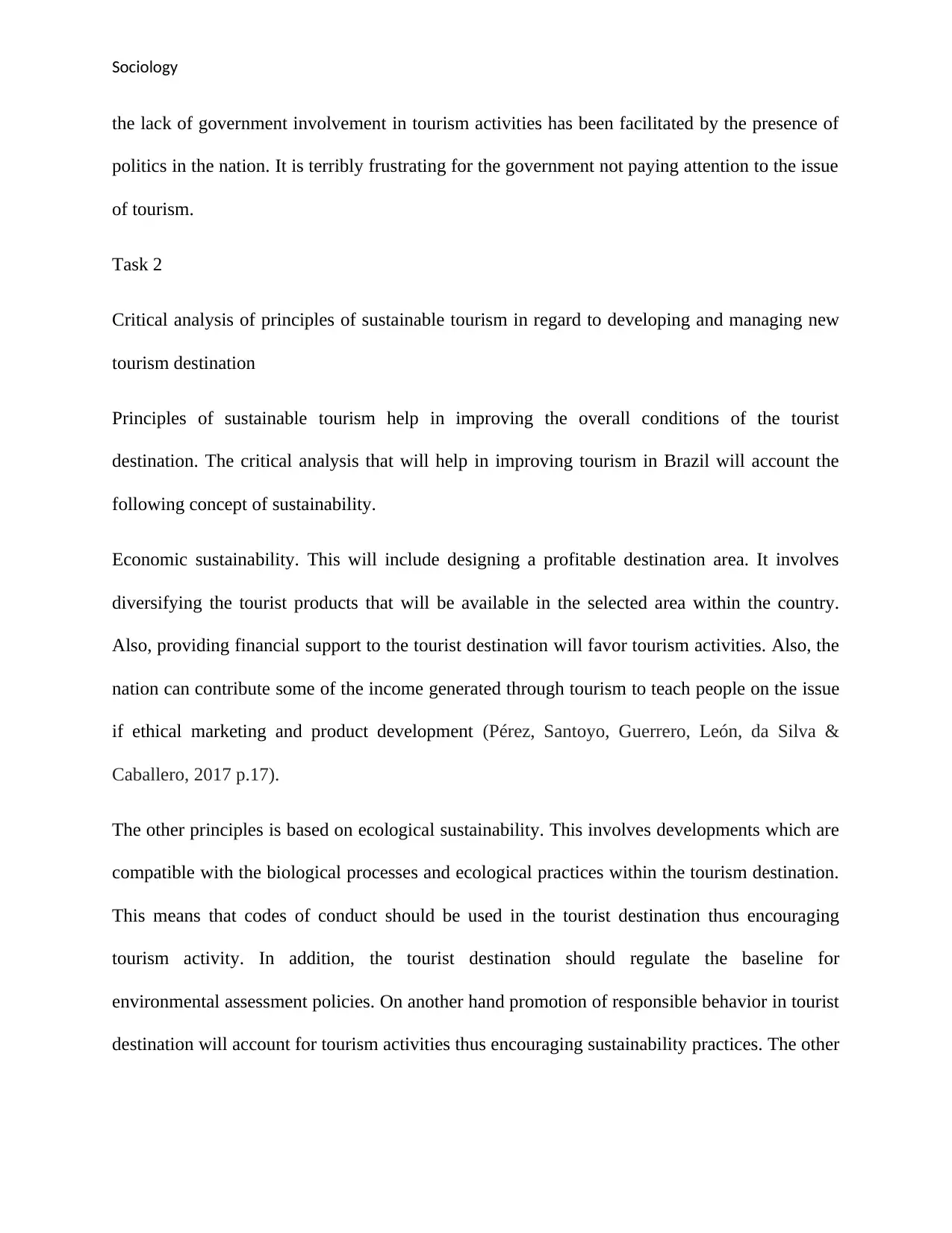
Sociology
the lack of government involvement in tourism activities has been facilitated by the presence of
politics in the nation. It is terribly frustrating for the government not paying attention to the issue
of tourism.
Task 2
Critical analysis of principles of sustainable tourism in regard to developing and managing new
tourism destination
Principles of sustainable tourism help in improving the overall conditions of the tourist
destination. The critical analysis that will help in improving tourism in Brazil will account the
following concept of sustainability.
Economic sustainability. This will include designing a profitable destination area. It involves
diversifying the tourist products that will be available in the selected area within the country.
Also, providing financial support to the tourist destination will favor tourism activities. Also, the
nation can contribute some of the income generated through tourism to teach people on the issue
if ethical marketing and product development (Pérez, Santoyo, Guerrero, León, da Silva &
Caballero, 2017 p.17).
The other principles is based on ecological sustainability. This involves developments which are
compatible with the biological processes and ecological practices within the tourism destination.
This means that codes of conduct should be used in the tourist destination thus encouraging
tourism activity. In addition, the tourist destination should regulate the baseline for
environmental assessment policies. On another hand promotion of responsible behavior in tourist
destination will account for tourism activities thus encouraging sustainability practices. The other
the lack of government involvement in tourism activities has been facilitated by the presence of
politics in the nation. It is terribly frustrating for the government not paying attention to the issue
of tourism.
Task 2
Critical analysis of principles of sustainable tourism in regard to developing and managing new
tourism destination
Principles of sustainable tourism help in improving the overall conditions of the tourist
destination. The critical analysis that will help in improving tourism in Brazil will account the
following concept of sustainability.
Economic sustainability. This will include designing a profitable destination area. It involves
diversifying the tourist products that will be available in the selected area within the country.
Also, providing financial support to the tourist destination will favor tourism activities. Also, the
nation can contribute some of the income generated through tourism to teach people on the issue
if ethical marketing and product development (Pérez, Santoyo, Guerrero, León, da Silva &
Caballero, 2017 p.17).
The other principles is based on ecological sustainability. This involves developments which are
compatible with the biological processes and ecological practices within the tourism destination.
This means that codes of conduct should be used in the tourist destination thus encouraging
tourism activity. In addition, the tourist destination should regulate the baseline for
environmental assessment policies. On another hand promotion of responsible behavior in tourist
destination will account for tourism activities thus encouraging sustainability practices. The other
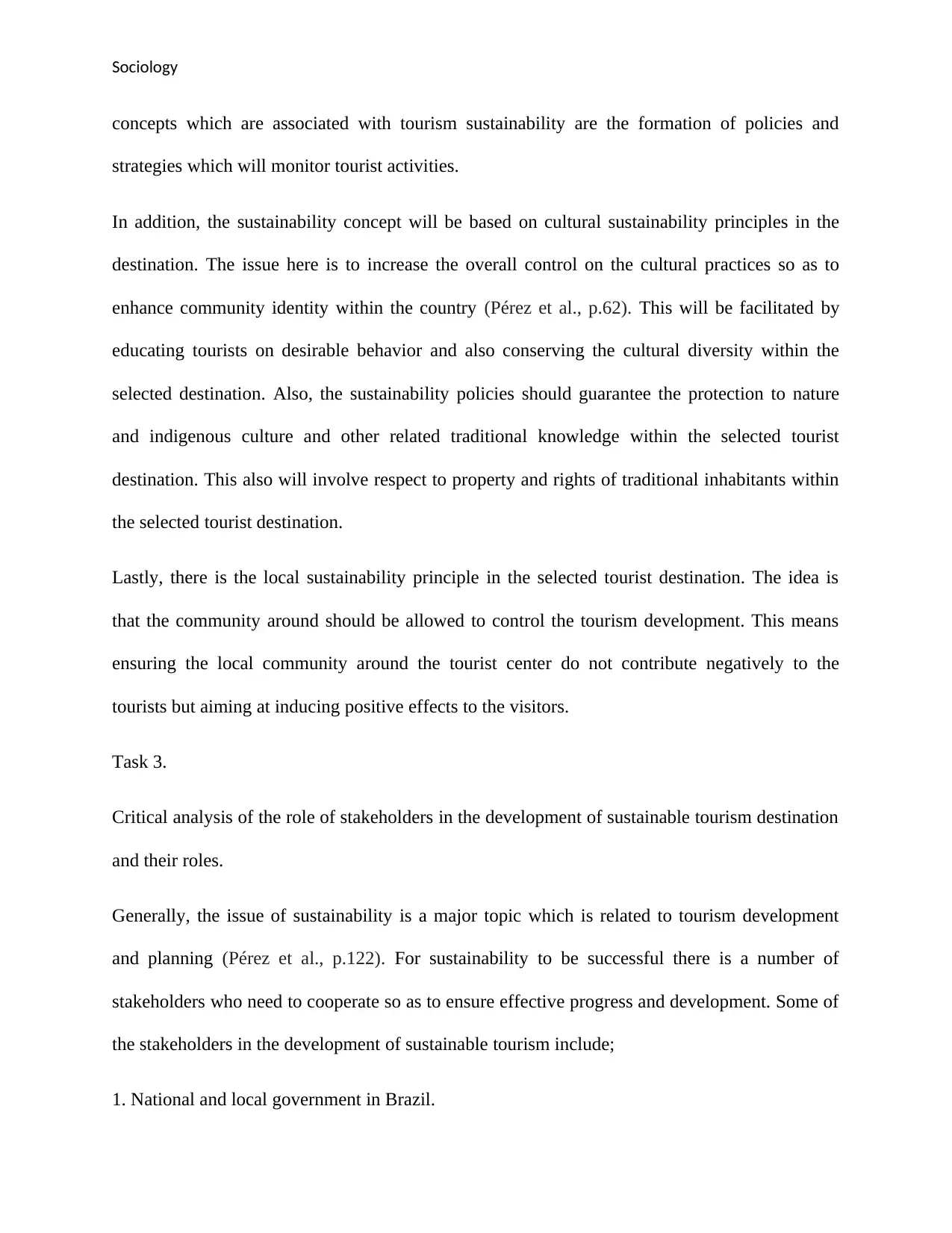
Sociology
concepts which are associated with tourism sustainability are the formation of policies and
strategies which will monitor tourist activities.
In addition, the sustainability concept will be based on cultural sustainability principles in the
destination. The issue here is to increase the overall control on the cultural practices so as to
enhance community identity within the country (Pérez et al., p.62). This will be facilitated by
educating tourists on desirable behavior and also conserving the cultural diversity within the
selected destination. Also, the sustainability policies should guarantee the protection to nature
and indigenous culture and other related traditional knowledge within the selected tourist
destination. This also will involve respect to property and rights of traditional inhabitants within
the selected tourist destination.
Lastly, there is the local sustainability principle in the selected tourist destination. The idea is
that the community around should be allowed to control the tourism development. This means
ensuring the local community around the tourist center do not contribute negatively to the
tourists but aiming at inducing positive effects to the visitors.
Task 3.
Critical analysis of the role of stakeholders in the development of sustainable tourism destination
and their roles.
Generally, the issue of sustainability is a major topic which is related to tourism development
and planning (Pérez et al., p.122). For sustainability to be successful there is a number of
stakeholders who need to cooperate so as to ensure effective progress and development. Some of
the stakeholders in the development of sustainable tourism include;
1. National and local government in Brazil.
concepts which are associated with tourism sustainability are the formation of policies and
strategies which will monitor tourist activities.
In addition, the sustainability concept will be based on cultural sustainability principles in the
destination. The issue here is to increase the overall control on the cultural practices so as to
enhance community identity within the country (Pérez et al., p.62). This will be facilitated by
educating tourists on desirable behavior and also conserving the cultural diversity within the
selected destination. Also, the sustainability policies should guarantee the protection to nature
and indigenous culture and other related traditional knowledge within the selected tourist
destination. This also will involve respect to property and rights of traditional inhabitants within
the selected tourist destination.
Lastly, there is the local sustainability principle in the selected tourist destination. The idea is
that the community around should be allowed to control the tourism development. This means
ensuring the local community around the tourist center do not contribute negatively to the
tourists but aiming at inducing positive effects to the visitors.
Task 3.
Critical analysis of the role of stakeholders in the development of sustainable tourism destination
and their roles.
Generally, the issue of sustainability is a major topic which is related to tourism development
and planning (Pérez et al., p.122). For sustainability to be successful there is a number of
stakeholders who need to cooperate so as to ensure effective progress and development. Some of
the stakeholders in the development of sustainable tourism include;
1. National and local government in Brazil.
Paraphrase This Document
Need a fresh take? Get an instant paraphrase of this document with our AI Paraphraser
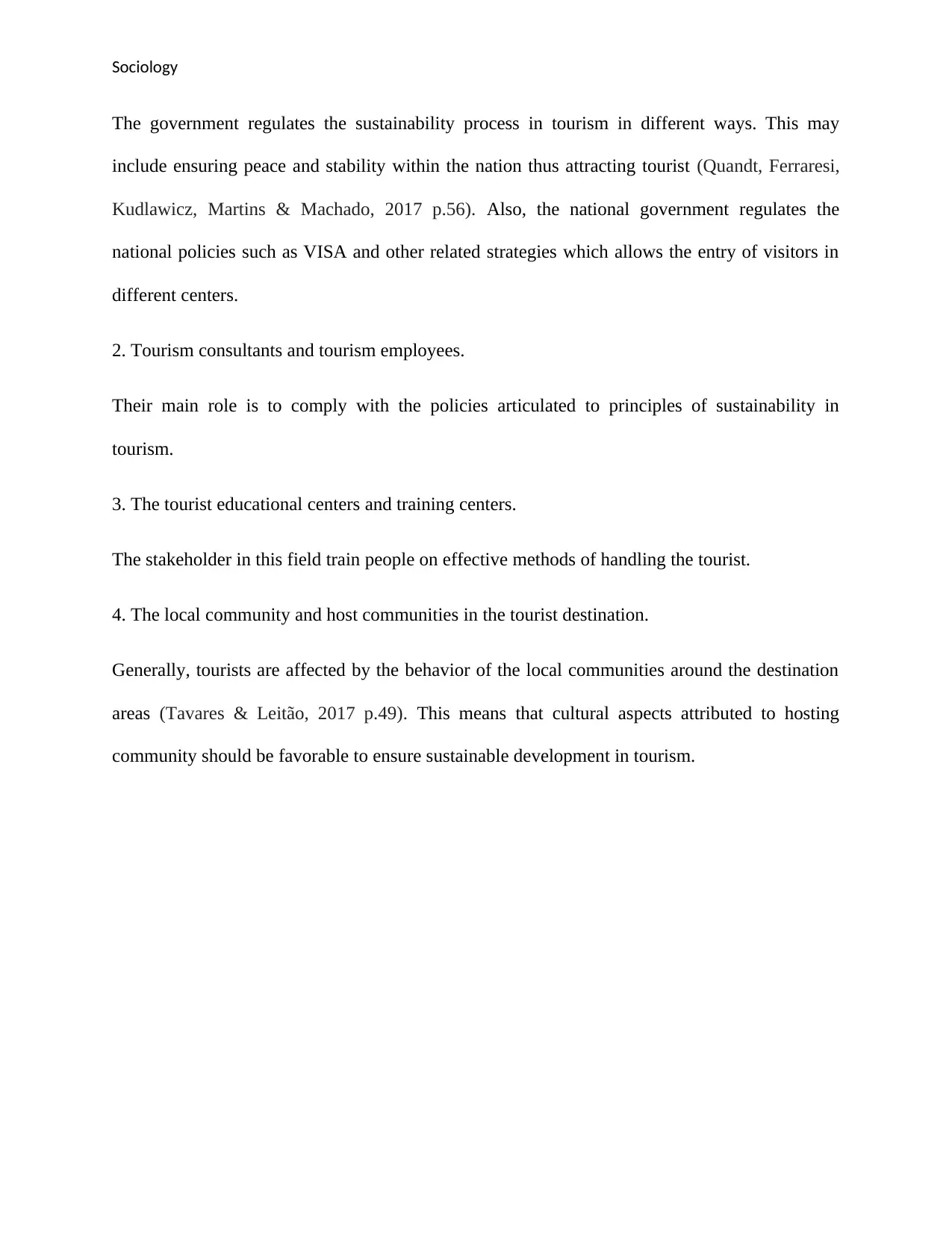
Sociology
The government regulates the sustainability process in tourism in different ways. This may
include ensuring peace and stability within the nation thus attracting tourist (Quandt, Ferraresi,
Kudlawicz, Martins & Machado, 2017 p.56). Also, the national government regulates the
national policies such as VISA and other related strategies which allows the entry of visitors in
different centers.
2. Tourism consultants and tourism employees.
Their main role is to comply with the policies articulated to principles of sustainability in
tourism.
3. The tourist educational centers and training centers.
The stakeholder in this field train people on effective methods of handling the tourist.
4. The local community and host communities in the tourist destination.
Generally, tourists are affected by the behavior of the local communities around the destination
areas (Tavares & Leitão, 2017 p.49). This means that cultural aspects attributed to hosting
community should be favorable to ensure sustainable development in tourism.
The government regulates the sustainability process in tourism in different ways. This may
include ensuring peace and stability within the nation thus attracting tourist (Quandt, Ferraresi,
Kudlawicz, Martins & Machado, 2017 p.56). Also, the national government regulates the
national policies such as VISA and other related strategies which allows the entry of visitors in
different centers.
2. Tourism consultants and tourism employees.
Their main role is to comply with the policies articulated to principles of sustainability in
tourism.
3. The tourist educational centers and training centers.
The stakeholder in this field train people on effective methods of handling the tourist.
4. The local community and host communities in the tourist destination.
Generally, tourists are affected by the behavior of the local communities around the destination
areas (Tavares & Leitão, 2017 p.49). This means that cultural aspects attributed to hosting
community should be favorable to ensure sustainable development in tourism.
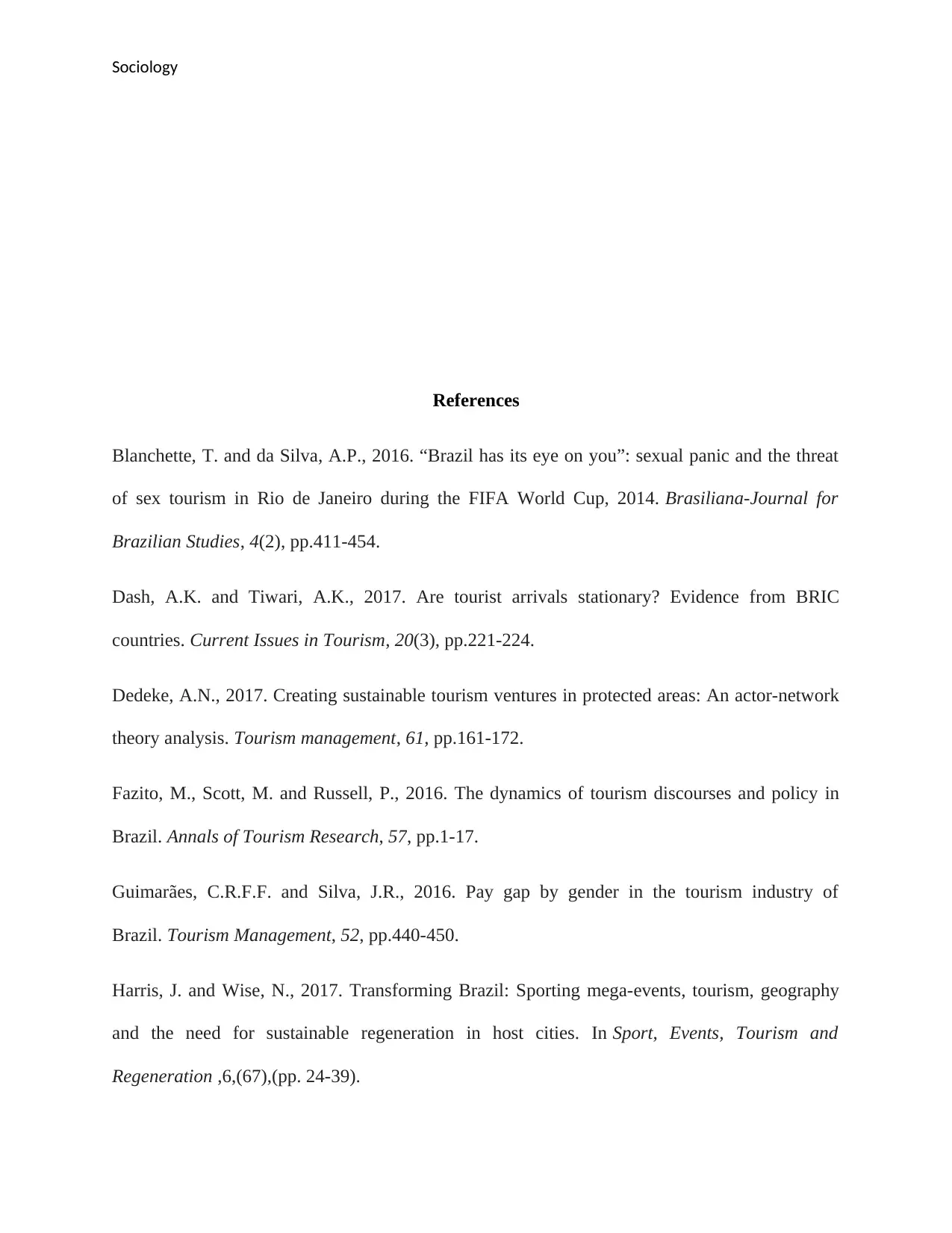
Sociology
References
Blanchette, T. and da Silva, A.P., 2016. “Brazil has its eye on you”: sexual panic and the threat
of sex tourism in Rio de Janeiro during the FIFA World Cup, 2014. Brasiliana-Journal for
Brazilian Studies, 4(2), pp.411-454.
Dash, A.K. and Tiwari, A.K., 2017. Are tourist arrivals stationary? Evidence from BRIC
countries. Current Issues in Tourism, 20(3), pp.221-224.
Dedeke, A.N., 2017. Creating sustainable tourism ventures in protected areas: An actor-network
theory analysis. Tourism management, 61, pp.161-172.
Fazito, M., Scott, M. and Russell, P., 2016. The dynamics of tourism discourses and policy in
Brazil. Annals of Tourism Research, 57, pp.1-17.
Guimarães, C.R.F.F. and Silva, J.R., 2016. Pay gap by gender in the tourism industry of
Brazil. Tourism Management, 52, pp.440-450.
Harris, J. and Wise, N., 2017. Transforming Brazil: Sporting mega-events, tourism, geography
and the need for sustainable regeneration in host cities. In Sport, Events, Tourism and
Regeneration ,6,(67),(pp. 24-39).
References
Blanchette, T. and da Silva, A.P., 2016. “Brazil has its eye on you”: sexual panic and the threat
of sex tourism in Rio de Janeiro during the FIFA World Cup, 2014. Brasiliana-Journal for
Brazilian Studies, 4(2), pp.411-454.
Dash, A.K. and Tiwari, A.K., 2017. Are tourist arrivals stationary? Evidence from BRIC
countries. Current Issues in Tourism, 20(3), pp.221-224.
Dedeke, A.N., 2017. Creating sustainable tourism ventures in protected areas: An actor-network
theory analysis. Tourism management, 61, pp.161-172.
Fazito, M., Scott, M. and Russell, P., 2016. The dynamics of tourism discourses and policy in
Brazil. Annals of Tourism Research, 57, pp.1-17.
Guimarães, C.R.F.F. and Silva, J.R., 2016. Pay gap by gender in the tourism industry of
Brazil. Tourism Management, 52, pp.440-450.
Harris, J. and Wise, N., 2017. Transforming Brazil: Sporting mega-events, tourism, geography
and the need for sustainable regeneration in host cities. In Sport, Events, Tourism and
Regeneration ,6,(67),(pp. 24-39).
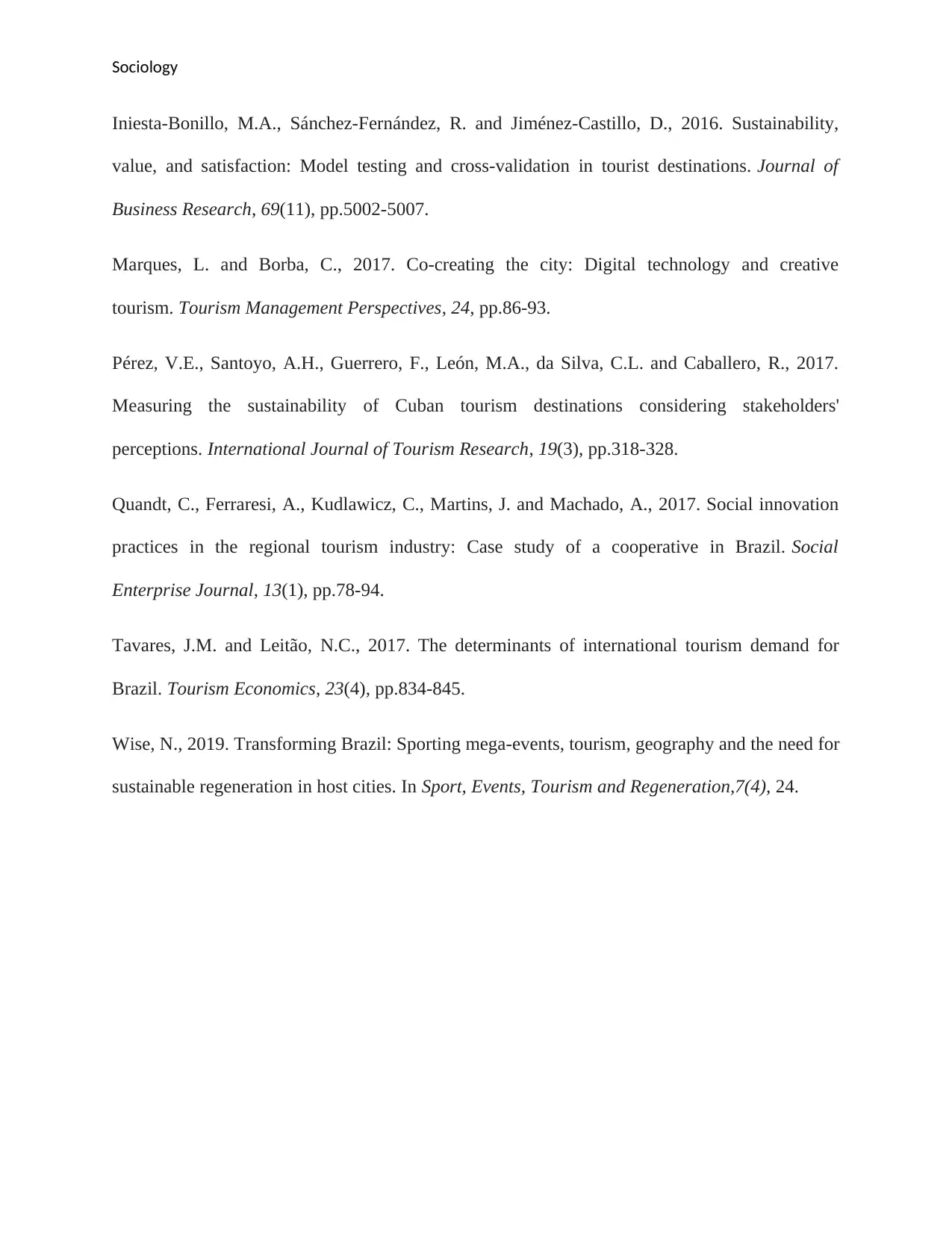
Sociology
Iniesta-Bonillo, M.A., Sánchez-Fernández, R. and Jiménez-Castillo, D., 2016. Sustainability,
value, and satisfaction: Model testing and cross-validation in tourist destinations. Journal of
Business Research, 69(11), pp.5002-5007.
Marques, L. and Borba, C., 2017. Co-creating the city: Digital technology and creative
tourism. Tourism Management Perspectives, 24, pp.86-93.
Pérez, V.E., Santoyo, A.H., Guerrero, F., León, M.A., da Silva, C.L. and Caballero, R., 2017.
Measuring the sustainability of Cuban tourism destinations considering stakeholders'
perceptions. International Journal of Tourism Research, 19(3), pp.318-328.
Quandt, C., Ferraresi, A., Kudlawicz, C., Martins, J. and Machado, A., 2017. Social innovation
practices in the regional tourism industry: Case study of a cooperative in Brazil. Social
Enterprise Journal, 13(1), pp.78-94.
Tavares, J.M. and Leitão, N.C., 2017. The determinants of international tourism demand for
Brazil. Tourism Economics, 23(4), pp.834-845.
Wise, N., 2019. Transforming Brazil: Sporting mega-events, tourism, geography and the need for
sustainable regeneration in host cities. In Sport, Events, Tourism and Regeneration,7(4), 24.
Iniesta-Bonillo, M.A., Sánchez-Fernández, R. and Jiménez-Castillo, D., 2016. Sustainability,
value, and satisfaction: Model testing and cross-validation in tourist destinations. Journal of
Business Research, 69(11), pp.5002-5007.
Marques, L. and Borba, C., 2017. Co-creating the city: Digital technology and creative
tourism. Tourism Management Perspectives, 24, pp.86-93.
Pérez, V.E., Santoyo, A.H., Guerrero, F., León, M.A., da Silva, C.L. and Caballero, R., 2017.
Measuring the sustainability of Cuban tourism destinations considering stakeholders'
perceptions. International Journal of Tourism Research, 19(3), pp.318-328.
Quandt, C., Ferraresi, A., Kudlawicz, C., Martins, J. and Machado, A., 2017. Social innovation
practices in the regional tourism industry: Case study of a cooperative in Brazil. Social
Enterprise Journal, 13(1), pp.78-94.
Tavares, J.M. and Leitão, N.C., 2017. The determinants of international tourism demand for
Brazil. Tourism Economics, 23(4), pp.834-845.
Wise, N., 2019. Transforming Brazil: Sporting mega-events, tourism, geography and the need for
sustainable regeneration in host cities. In Sport, Events, Tourism and Regeneration,7(4), 24.
1 out of 10
Your All-in-One AI-Powered Toolkit for Academic Success.
+13062052269
info@desklib.com
Available 24*7 on WhatsApp / Email
![[object Object]](/_next/static/media/star-bottom.7253800d.svg)
Unlock your academic potential
© 2024 | Zucol Services PVT LTD | All rights reserved.





